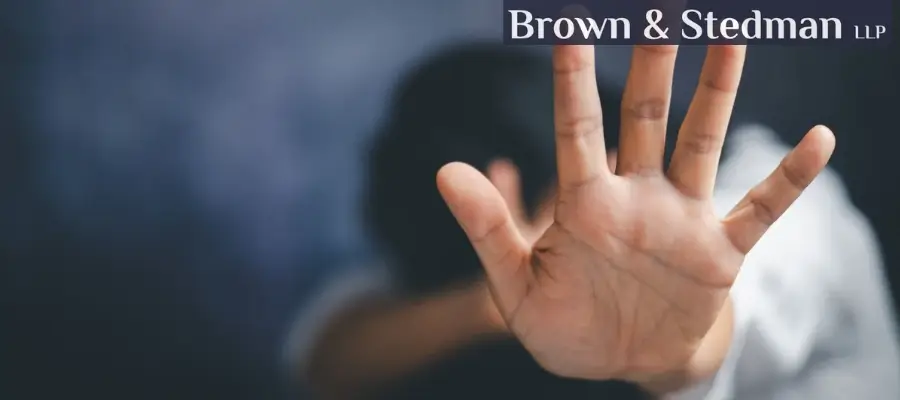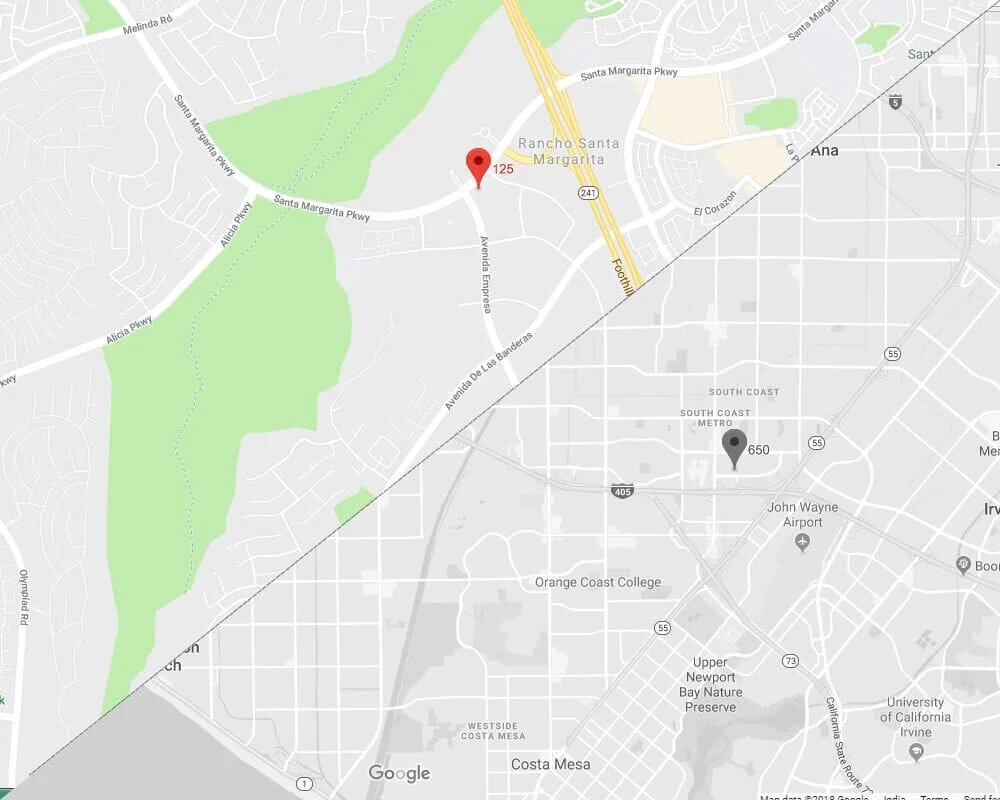Riverside Domestic Violence Attorney

Riverside Domestic Violence Lawyer
If you are facing domestic violence charges, you need skilled Riverside domestic violence attorney by your side. At Brown & Stedman LLP, our team of defense lawyers offers decades of experience and aims to offer you the representation you deserve.

Definition of Domestic Violence
In California, domestic violence is the abuse or threats of abuse between people who have a close relationship. This includes current or ex-spouses or couples, family members, and roommates and other individuals involved in criminal cases. The abuse can include physical violence, emotional abuse, stalking, or other similar behaviors, such as:
- Hitting, slapping, or kicking
- Use of weapons to threaten or harm
- Holding the victim against their will
- Verbal threats or intimidation
- Criticism, insults, or humiliation
- Isolation from friends, family, or other support networks
- Controlling behaviors, such as monitoring activities or finances
- Non-consensual sexual acts
- Cyberbullying or online harassment
Domestic Violence Prosecution Steps
A domestic violence case will begin with a call to law enforcement. Police officers will investigate the incident, gather evidence, and interview everyone involved in the situation. If there is evidence of domestic violence and probable cause, the police may make an arrest. That person will be booked, and charges may be filed against them.
In some cases, an Emergency Protective Order (EPO) may be immediately requested to protect the victim. This protective order will stay in effect until any potential legal proceedings take place.
Once the case is sent to the prosecutor’s office, they will decide whether to file formal charges. The prosecutors will consider the evidence and the severity of what happened. If charges are filed, the defendant will be arraigned. There, they are informed of the charges, advised of their rights, and asked to enter a plea.
After the charges are filed, there will be pretrial proceedings. These include the prosecution and the defense meeting to discuss motions and negotiations. The defense may challenge evidence or try to find a resolution through plea bargaining.
If the prosecution and defense cannot agree to a resolution, the case will go to trial. During the trial, the prosecution will present evidence, and the defense will argue its case. After everything is laid out, a judge or jury will determine if the defendant is guilty or innocent.
If the defendant is found guilty, they will be sentenced. After this, they may choose to appeal the verdict or seek a modification of orders. The victim may also choose to pursue civil action to recover damages through a civil domestic violence claim.
It is important to keep in mind that every case will be unique, and consulting with an experienced domestic violence attorney can help you understand what you may experience.
Riverside, CA Domestic Violence Penalties
After a conviction, the judge will sentence the offender. There may also be certain penalties that occur before the trial. These penalties include:
- Criminal Penalties: Domestic violence charges can be classified as misdemeanors or felonies, depending on the severity of the offense and whether the alleged abuser has a criminal history. There might also be prison or jail time, ranging from days to years, as well as fines.
- Restraining Orders: There are different types of restraining orders that can be issued to protect victims. The main type is a Domestic Violence Restraining Order (DVRO). A DVRO can be issued to obtain long-term legal protection against an alleged abuser and is separate from any criminal proceedings. There are also EPOs or Temporary Restraining Orders (TRO) to provide immediate protection until a court hearing is held.
- Probation: The courts may impose probation with specific conditions, such as counseling or completing an intervention program.
- Criminal Record: A domestic violence conviction will be a permanent part of the defendant’s criminal record. This may affect future employment, housing, or education. A criminal record can also impact their right to own or possess firearms.
- Civil Consequences: Victims may pursue civil claims against their alleged abusers for damages, including medical expenses, therapy costs, and pain and suffering.
In addition to these potential penalties, a domestic violence conviction could also impact child custody and visitation arrangements. There may also be social implications, such as a change in family dynamics, the loss of social support, and negative community perceptions and stigma.
Civil Domestic Abuse Claims
In Riverside, California, victims of domestic violence may pursue civil claims in addition to criminal proceedings, as they are separate actions. A civil domestic violence claim is intended to provide victims with compensation and protection through the recovery of economic and non-economic damages, punitive damages, and injunctive relief through restraining orders.
Economic damages are the documented financial costs to the victim that came from the injuries or harm they endured. This can include treatment, therapy, any lost wages, or the cost of damaged or destroyed property.
Non-economic damages commonly include pain and suffering, such as anxiety, emotional distress, embarrassment and humiliation, or loss of enjoyment or quality of life. A victim may even receive damages for loss of companionship, support, and intimacy. This is called consortium. Determining the correct amount of compensation often involves presenting evidence and arguments to demonstrate the extent of the emotional and psychological suffering.
Punitive damages are meant as a punishment for the alleged abuser and are pursued when the actions they committed have been egregious and severe. They are intended to deter them and others from engaging in similar behaviors in the future.
Victims often seek injunctive relief through restraining orders to protect themselves from further harm or harassment by the alleged abuser. The terms “injunctive relief” and “restraining order” are often used interchangeably. Typically, the victim will file for a DVRO, since this is a long-term protection order. It typically lasts for several years and can be renewed if needed.
Defenses Against Domestic Violence Charges
Building a strong defense is essential to protect your rights and prove your innocence when you are being charged with domestic violence. Each case is unique, and the defenses that might be used are dependent on the specific circumstances.
These are some of the frequently used defenses in domestic violence cases:
- Self-Defense: This is one of the most common defense strategies. You have the right to self-defense, as California is a “stand your ground” state. It may be argued that the defendant acted in response to a threat or act of violence initiated by the victim, usually with documentation or police reports and statements as evidence.
- Lack of Evidence: Challenging the prosecution’s evidence or even highlighting gaps in their case can be used to sow reasonable doubt about the defendant’s guilt. This can involve questioning the credibility of witnesses or the reliability of the evidence.
- False Accusations: This may involve bringing evidence that contradicts the victim’s claims as false or exaggerated, such as witness statements, alibis, forensic evidence, or any motive for the victim to fabricate the accusation.
- Consent or Reciprocal Violence: The defense may argue that both parties were participating in mutual fighting or that the victim consented to the defendant’s actions. This is usually supported through witness statements, text messages, or other documentation that shows a history of consent.
- Procedural Errors or Misconduct: The criminal defense attorney may challenge the procedures followed by law enforcement or the prosecution. This can include illegal search and seizure, Miranda Rights violations, improper arrest procedures, witness tampering or intimidation, chain of custody issues, or the arresting officers’ alleged racial, cultural, or gender biases.
- Character Evidence: Presenting evidence of the defendant’s good character or prior non-violent behaviors may be used. It may also be useful to challenge the victim’s credibility through evidence of their own history of mental health issues, violence, or substance abuse.
To avoid a trial and potentially reduce any charges or penalties, the defendant and their defense lawyer may decide to negotiate a plea bargain. The criminal defense attorneys at Brown & Stedman LLP can closely examine the unique details of your case and build a strong strategy. Since every case is different, your defense will be as well.
Getting a Domestic Violence Case Dismissed
It can be hard to get domestic violence charges dropped in California, as it is up to the district attorney, prosecutor, or judge to dismiss the case. A seasoned defense attorney may assert that the prosecution lacks sufficient evidence to get a guilty verdict, possibly due to the following reasons:
- The interaction with the victim was unintentional.
- The contact did not result in harm or injury.
- They acted in self-defense.
- The victim has no visible signs of injuries.
- Inconsistencies are present in witness or victim statements.
- The victim wants to drop the charges or does not want to cooperate.
- There is evidence that the victim made up the allegations.
- The police lacked probable cause for the arrest.
- Constitutional rights were violated.
If the prosecution sees the case as weak, given these reasons or others, they might choose to drop the charges instead of risking losing the case. They may also agree to plead down the charges with the defendant and their lawyer.
Choose the Right Domestic Violence Attorney
If you have been accused of domestic violence in Riverside, it is important to choose the right domestic violence lawyer. At Brown & Stedman LLP, our lawyers have extensive legal knowledge and experience in these matters. We can develop an effective defense strategy to navigate your legal challenges. Contact us today to discuss your options.
Learn More About What We Can Do To Help
We invite you to call us at 949-459-5900 to schedule your free initial consultation. You can also reach our firm by contacting us online.
Tell Us About Your Case
Each time we take a case, we look at the big picture: What can we do to best help solve the problem as efficiently as possible. We use our experience and creativity to propose solutions that allow you to put your legal matters behind you.
© 2025 Brown & Stedman LLP. All rights reserved.









